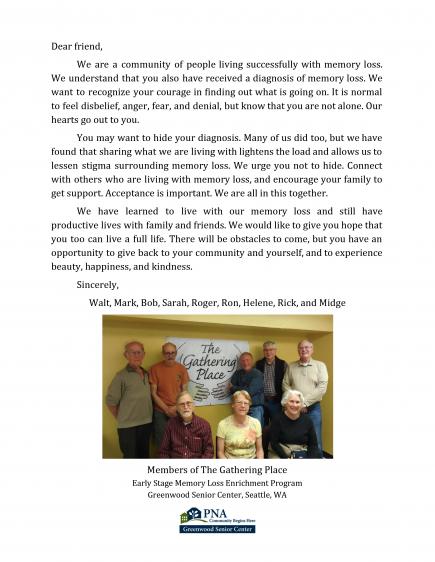Organization Websites
- Alzheimer's Association- Washington State Chapter is part of a worldwide voluntary health organization dedicated to Alzheimer’s care, support and research. Local chapters provide a broad range of care and support programs, education and advocacy, as well as funding for Alzheimer’s and dementia research.
- Alzheimers.gov - Tips for Caregivers and Families of People With Dementia
- Dementia Support Northwest -Dementia Support Northwest (DSNW) primarily serves Whatcom and Skagit counties. It is a registered not-for-profit organization whose mission is to help those people and their families affected by dementia with the education, support and resources to empower them.
- Community Living Connections - (Area Agencies on Aging/AAAs) or 855-567-0252
Informational Resources
- Support for Caregivers - (Chapter 8 of the UW MBWC 'Living with Memory Loss' handbook) Tips from other families traveling the caregiver path and information on being supportive, and how caregivers can take care of themselves while caring for a loved one.
-
memorylossinfowa.org a resource for the local public offering information and resources on memory loss and Alzheimer's and dementia, including detailed sections on driving, long-terms support and services, caregiving, medical and safety, issues, and legal/financial. This website portal is a resource of Washington State’s Community Living Connections, part of a national collaborative effort of the U.S. Department of Health and Human Services, the Veterans Administration and the Centers for Medicare & Medicaid Services designed to help individuals of all ages, disabilities and income levels, their caregivers, legal representatives and families get the right home and community-based supports and services at the right time, in the right place.
-
Mayor's Council on African American Elders - Learn about Memory Sunday, Grandparent's Day, and the Legacy of Love African American Caregivers Forum.
-
The National Brain Health Center for African Americans - Resources for brain health and caregiving. The mission of The National Brain Health Center for African Americans (NBHCAA) is to raise awareness of the issues of cognitive health among African Americans by working through networks of faith-based institutions. The Brain Health Center serves as an information hub on the human brain that must be shared throughout all networks that reach and touch approximately 40 million African Americans living in the United States.
-
Washington State Caregiver Resources from the Aging and Long-Term Support Administration
-
Family Caregiver Support Network provides a free consultation and referrals to services which may include things like support groups or counseling, training on specific caregiving topics or concerns, and respite care if you need a break. King County, Snohomish County
-
Dementia Road Map for family and friends, produced by our partners in the Washington State Dementia Action Collaborative, provides a basic overview of what to expect, and what can help, at every stage of the journey
Support for Lewy Body Dementia and Parkinson's Disease Dementia Caregivers
The Lewy Body Dementia Association
- Caregiver Resources: A portal to a variety of caregiving support resources, such as caregiving publications, care briefs, LBD stories, information for families, and diagnostic checklist.
- 10 Things You Should Know about LBD
UW Memory and Brain Wellness Center
Mayo Clinic
Support for FTD care partners
-
Caregiver support groups for Alzheimer’s disease, Lewy body dementia, and frontotemporal dementia, provided by the Alzheimer’s Association at 'We Can Help'. Call: 206.363.5500.
-
On Alzheimers.gov, please visit What is Frontotemporal Dementia? and Tips for Caregivers and Families of People With Dementia
-
Support for FTD Care partners at the Association for Frontotemporal Degeneration (AFTD)
-
Northwest Region FTD resources and support groups at the Association for Frontotemporal Degeneration (AFTD)
-
Support group for frontotemporal dementia caregivers in Seattle- Offered by the Alzheimer's Association
Education for care partners
-
Health Resources & Services Administration (HRSA) of the HHS offers Training Curriculum: Alzheimer’s Disease and Related Dementias: free online educational modules on several dementia topics, including ones targeted for caregivers.
-
UW Indigenous Aging Resources, a new section on the affiliated UW Alzheimer's Disease Research Center website, is meant to provide resources and education about Alzheimer’s disease and mild cognitive impairment to American Indian/Alaska Native communities in the Pacific Northwest. The website pages, a project of the ORE Core, contain culturally appropriate information for AI/AN individuals and caregivers. The site showcases the tailored brochures, outreach posters, and provider training slide show presentations for AI/AN clinic providers, produced in collaboration with WSU Partnerships for Native Health.
-
COMPASS Learning Opportunities by the Banner Alzheimer’s Foundation: These online classes provide essential information needed by family members, friends or professional caregivers after a new diagnosis of Alzheimer’s disease/related dementia is made and as the disease progresses.
Transportation Options
Staying socially engaged, cognitively stimulated, and physically active are three key recommendations for supporting brain health and overall well-being. If you don’t drive, however, getting out in the community can feel like a challenge. Fortunately, there are some alternative transportation options available in many areas.
As with any new habit, getting the hang of alternative travel takes time. It’s great to start developing new strategies for getting around and building those routines into your procedural memory. Whether you want to plan ahead, or you’ve been looking for options for a while, here are some tips for you or your loved one with dementia:
Alternative Transportation Options by Kailan Bergstrom, a Masters of Social Work Practicum Student at the MBWC Clinic.
Links
-
Community Transit in Snohomish County
-
Cabulance service providers
-
Ride share programs through churches and senior centers
Dementia-Friendly Community Events
Washington State has a growing number of community-based arts, fitness, social and volunteer opportunities for persons with memory loss and their families. For more information about dementia-friendly communities, please visit our new website page devoted to this topic.

A letter from our friends at The Gathering Place, Early Stage Memory Loss Enrichment Program, Greenwood Senior Center, Seattle, WA



